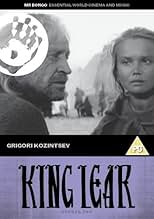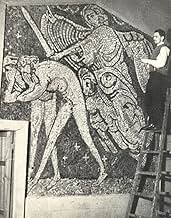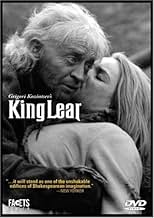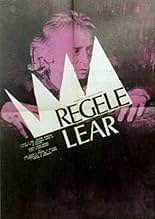CALIFICACIÓN DE IMDb
8.0/10
1.8 k
TU CALIFICACIÓN
Adaptación soviética de una tragedia mundialmente conocida sobre un rey anciano y la cruel pérdida de sus ilusiones.Adaptación soviética de una tragedia mundialmente conocida sobre un rey anciano y la cruel pérdida de sus ilusiones.Adaptación soviética de una tragedia mundialmente conocida sobre un rey anciano y la cruel pérdida de sus ilusiones.
- Dirección
- Guionistas
- Elenco
- Premios
- 2 nominaciones en total
Jüri Järvet
- King Lear
- (as Yuri Yarvet)
Elza Radzina
- Goneril
- (as E. Radzina)
Galina Volchek
- Regan
- (as G. Volchek)
Valentina Shendrikova
- Cordelia
- (as V. Shendrikova)
Karlis Sebris
- Gloster
- (as K. Sebris)
Leonhard Merzin
- Edgar
- (as L. Merzin)
Regimantas Adomaitis
- Edmund
- (as R. Adomaytis)
Vladimir Emelyanov
- Kent
- (as V. Yemelyanov)
Aleksandr Vokach
- Cornwall
- (as A. Vokach)
Donatas Banionis
- Albany
- (as D. Banionis)
Aleksey Petrenko
- Oswald
- (as A. Petrenko)
Juozas Budraitis
- King of France
- (as I. Budraytis)
Opiniones destacadas
Black and white cinematography of Gritsius, the music of Shostakovich and the enigmatic face of Jarvet, make all other versions of King Lear smaller in stature. Lord Olivier himself acknowledged the stark brilliance of this film. Oleg Dal's fool lends a fascinating twist to the character. The "Christian Marxism" of Kozintsev can knock-out any serious student of cinema and Shakespeare.
Kozintsev is one of least sung masters of Russian cinema. His cinema is very close to that of Tarkovsky and Sergei Paradjanov. Kozintsev's Lear is not a Lear that mourns his past and his daughters--his Lear is close to the soil, the plants, and all elements of nature. That's what makes Kozintsev's Shakespearean works outstanding.
I fell in love with Kozintsev's King Lear some 30 years ago and I continue to be enraptured by the black-and-white film shot in cinemascope each time I see it. Each time you view the film, one realizes that a creative genius can embellish another masterpiece from another medium by providing food for thought---much beyond what Shakespeare offered his audiences centuries ago. Purists like Lord Laurence Olivier and Peter Brook offered cinematic versions of the play that remained true to what the Bard originally intended, only refining performances within the accepted matrices.
But Kozintsev's cinema based on the Russian translation of Nobel laureate Boris Pasternak added a "silent ghost" that was always present in Shakespeare's playnature. Mother nature is present as a visual and aural force in the two Shakespeare films of Kozintsev, more so in King Lear. Shakespeare had intended to draw parallels in nature and human beingsonly Kozintsev saw the opportunity in highlighting this. The team of Kozintsev and Pasternak took another libertythe last shot of the film includes the Fool playing his pipe, while the Bard had got rid of the Fool in Act IV of the play. Kozintsev had more than one reason for itthe Fool is akin to the chorus of Greek stage and much of Dmitri Shostakovich's haunting musical score for the film involved woodwind instruments. Further, the poor, beyond the portals of the army and the courts, occupy "screen-space" never intended in the play. Kozintsev and Pasternak remained true to the basic structure of Shakespeare only adding details that offer astounding food for thought.
I recommend this version to serious viewers. Don't miss this little known classic.
Kozintsev is one of least sung masters of Russian cinema. His cinema is very close to that of Tarkovsky and Sergei Paradjanov. Kozintsev's Lear is not a Lear that mourns his past and his daughters--his Lear is close to the soil, the plants, and all elements of nature. That's what makes Kozintsev's Shakespearean works outstanding.
I fell in love with Kozintsev's King Lear some 30 years ago and I continue to be enraptured by the black-and-white film shot in cinemascope each time I see it. Each time you view the film, one realizes that a creative genius can embellish another masterpiece from another medium by providing food for thought---much beyond what Shakespeare offered his audiences centuries ago. Purists like Lord Laurence Olivier and Peter Brook offered cinematic versions of the play that remained true to what the Bard originally intended, only refining performances within the accepted matrices.
But Kozintsev's cinema based on the Russian translation of Nobel laureate Boris Pasternak added a "silent ghost" that was always present in Shakespeare's playnature. Mother nature is present as a visual and aural force in the two Shakespeare films of Kozintsev, more so in King Lear. Shakespeare had intended to draw parallels in nature and human beingsonly Kozintsev saw the opportunity in highlighting this. The team of Kozintsev and Pasternak took another libertythe last shot of the film includes the Fool playing his pipe, while the Bard had got rid of the Fool in Act IV of the play. Kozintsev had more than one reason for itthe Fool is akin to the chorus of Greek stage and much of Dmitri Shostakovich's haunting musical score for the film involved woodwind instruments. Further, the poor, beyond the portals of the army and the courts, occupy "screen-space" never intended in the play. Kozintsev and Pasternak remained true to the basic structure of Shakespeare only adding details that offer astounding food for thought.
I recommend this version to serious viewers. Don't miss this little known classic.
10dysandez
Back in high school, I had to watch this as we were studying King Lear in class.
Having watched both the Brooks and Olivier versions, I went in somewhat cautiously- I wasn't too fond of either, finding the Olivier version to be too colourful, and the Brooks version sombre.
This proved a sobering reminder of how truly spectacular cinematography can be if done correctly. This film gripped me like no other, and I watched riveted throughout.
The added Soviet focus on the peril of the peasant's, and the splendor of the palace helped to further heighten Lear's downfall. Chock-a-block full of brilliant performances, this has swiftly become one of my most treasured VHS tapes.
The only fault I could find was the somewhat tinny quality of the sound- but for a movie of the time, the quality was excellent.
A remarkable, truly moving film I recommend to everyone.
Having watched both the Brooks and Olivier versions, I went in somewhat cautiously- I wasn't too fond of either, finding the Olivier version to be too colourful, and the Brooks version sombre.
This proved a sobering reminder of how truly spectacular cinematography can be if done correctly. This film gripped me like no other, and I watched riveted throughout.
The added Soviet focus on the peril of the peasant's, and the splendor of the palace helped to further heighten Lear's downfall. Chock-a-block full of brilliant performances, this has swiftly become one of my most treasured VHS tapes.
The only fault I could find was the somewhat tinny quality of the sound- but for a movie of the time, the quality was excellent.
A remarkable, truly moving film I recommend to everyone.
Even, relaxed performances. Tasteful, non-intrusive direction. No gimmicks. And finally a clear, even obvious! result.
This might seem like damning with faint praise, except that Kozintsev has done what Brook didn't, what Olivier's BBC production didn't, and what every stage production I have ever seen resolutely and spectacularly failed to do. That is to create order and clarity and meaning within arguably the greatest and arguably the most difficult play ever written. It seems easy to do in Kosintsev's version, which is one of his great triumphs. see it
This might seem like damning with faint praise, except that Kozintsev has done what Brook didn't, what Olivier's BBC production didn't, and what every stage production I have ever seen resolutely and spectacularly failed to do. That is to create order and clarity and meaning within arguably the greatest and arguably the most difficult play ever written. It seems easy to do in Kosintsev's version, which is one of his great triumphs. see it
My Rating : 9/10
While I am not extremely well versed in Shakespeare and much less 'King Lear' I happily appreciated this interpretation.
There is a beautiful Soviet Union quality to it, the actors appearances, the harsh weather and conditions, the wild animals and the prose of Shakespeare make it a riveting and emotionally charged oeuvre of cinema.
A fine film indeed.
While I am not extremely well versed in Shakespeare and much less 'King Lear' I happily appreciated this interpretation.
There is a beautiful Soviet Union quality to it, the actors appearances, the harsh weather and conditions, the wild animals and the prose of Shakespeare make it a riveting and emotionally charged oeuvre of cinema.
A fine film indeed.
10yavigad
Just finished watching the the 1971 version of Griogiri Kozintsev's King Lear and felt compelled to write my first ever IMDb review to recommend it to anyone who has the opportunity to see it. It was like stumbling across a rare treasure where not expecting it, and I just can't keep my mouth shut. I hadn't heard of the movie before and was doubtful about watching a dubbed version. This proved to be less of a distraction than I expected, and afforded me the opportunity of concentrating on the characterizations and visuals. It was an amazing interpretation of Shakespeare that brought to life the tragedy of Lear through sweeping scenery,breathtaking cinematography and Shakespearean acting as as good as any I've ever seen. I found the VERY Russian style invigorating after having watched countless BBC versions of Shakespeare. Not only did I get a greater appreciation for the original play, but by the last haunting scene I felt privileged to have watched a towering cinematic creation.
¿Sabías que…?
- TriviaGrigoriy Kozintsev made this version of the play at the same time that Peter Brook was filming King Lear (1970), and the two directors corresponded with each other throughout shooting.
- ConexionesFeatured in King Lear (1987)
Selecciones populares
Inicia sesión para calificar y agrega a la lista de videos para obtener recomendaciones personalizadas
Detalles
- Tiempo de ejecución2 horas 20 minutos
- Color
- Mezcla de sonido
- Relación de aspecto
- 2.35 : 1
Contribuir a esta página
Sugiere una edición o agrega el contenido que falta


































